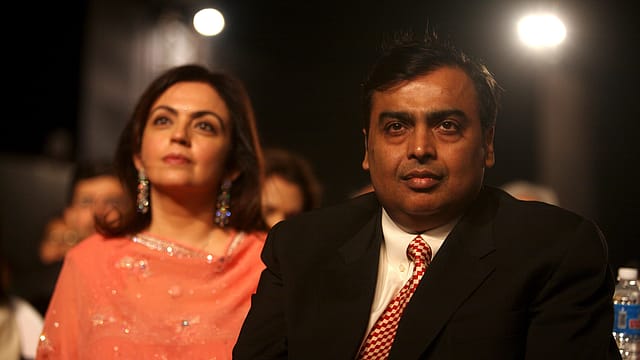The big brother bailout
ADVERTISEMENT

It could well be seen as a double whammy for Mukesh Ambani, India’s richest man. Fifteen years ago, after an acrimonious spat with his younger brother Anil, Mukesh, India’s richest man and the chairman of Reliance Industries , had to give up his sweat equity in Reliance Infocomm, which he was instrumental in creating with his close aide Manoj Modi. After his father’s death, when the assets were divided between the brothers, Anil got Infocomm which he renamed as Reliance Communications. On Monday, Mukesh shelled out an undisclosed sum to help Anil wriggle out of jail term for not paying debtors of Reliance Communications (RCOM).
In a statement, Anil Ambani thanked his billionaire brother “for standing by me during these trying times, and demonstrating the importance of staying true to our strong family values by extending this timely support”.
In the days leading up to the Supreme Court’s deadline of March 19 to pay Ericsson, the debtor who had filed a winding up petition against Reliance Communication, it seemed a foregone conclusion that the senior Ambani wouldn’t let his brother go to jail. Till last week, Anil was trying to desperately garner the cash about ₹458 crore – to pay up and avoid the jail term. When the court rejected a request from Reliance Communications to have its tax refunds released by the very banks it owned money to, there was palpable suspense.
There was no indication whatsoever that Mukesh would pay up. The senior Ambani was busy in the extended wedding celebrations of his son Akash even as Anil was running around to pick up the cash. The news eventually became public after Anil made a public statement thanking Mukesh and his wife Nita Ambani.
Those in the know say that shortly after Dhirubhai Ambani passed away, Mukesh wanted to take position as the family patriarch and help Anil along with his businesses. Though under Dhirubhai, both the sons were treated equally, Mukesh had built himself the reputation as someone who strategised for the business, while Anil took care of dealing with bankers, competition and public relations. But, a temperamental Anil was forced to claim his part of his business as he wouldn’t settle for anything less than an equal share in management of Reliance Industries. A showdown in a boardroom, where 11 out of 12 member sided with Mukesh sealed Anil’s fate.
Mukesh resigned to a division of assets, which was overseen by the then ICICI Bank chairman K.V. Kamath. After trying out many options, since it was impossible to cleave out the cash machine Reliance Industries without raising shareholder ire, Anil wanted Infocomm. Early valuations put Infocomm’s value at about ₹60,000 crore, while Reliance Industries was valued at ₹74,530 crore in December 2004.
According to people close to Mukesh, having to give up Infocomm broke his heart. He considered it his original idea and spent nearly a year reading, watching videos while running the treadmill and parlaying with technology gurus in the West before planning his big project of wiring up the country with optic fibre and bring cheap telecom services to the country. Much before data was spoken as a revolution, Mukesh had dreamt it all up and laid the ground work for it all. Nita Ambani also spent a lot of time in formulating advertising plans for Infocomm as she did in designing its headquarters popularly known as DAKC or Dhirubhai Ambani Knowledge City.
His close aid lamented losing the telecom business in early 2008, saying that Anil had demolished everything they had created and was further ruining the business. Mukesh had tied up with the likes of Microsoft and was already working on plans to wire up homes with streaming televisions in 2007. Anil pulled the plug on Microsoft and let the painstakingly created optic fibre network wither away. The aide then had said that they still had interest in telecom and when they came back they would teach everyone a new lesson. At that time, Mukesh couldn’t venture into telecom as there was a five year non-compete agreement disallowing the brothers to venture into the others’ domain.
Right after the non-compete agreement expired 2010, Mukesh re-entered the telecom business but did nothing for the next five years as his last mile strategy did not fall into place. By late 2015, after failing to cut deals with GSM players like Airtel and Vodafone to use their tower infrastructure, it appeared that Mukesh would have to fall back on Anil to use RCOMs infrastructure.
Even as the stipulated time was running out for Mukesh to launch Jio services as per the licence terms, Mukesh stuck a limited arrangement with his brother to use RCOMs assets. The details of the arrangement were never fully made public but it seemed at arms length relation even as the brothers were seen publicly together in a long while as the deal was being brokered. A senior executive who worked on both Infocomm and Jio said the tie-up was purely a commercial transaction and it was not meant to bail out or buyout his brother.
Post the initial deal, in 2018, Jio signed an understanding to buyout RCOM’s spectrum assets but that plan did not work due to regulatory glitches. Jio said that it wanted the spectrum to be rid of any past or accumulated dues of RCOM. After bailing out Anil on Monday, Jio has withdrawn its plan to buy RCOMs assets.
For a small cost, Mukesh may well have proven his point – that Anil needs his support.